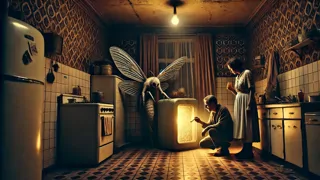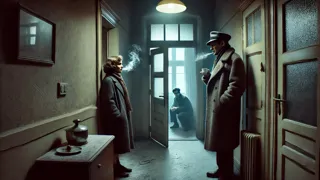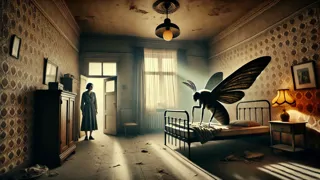Introduction
Berlin, 1957. Dawn sidled over the city’s patched-up roofs, brushing soot-stained bricks with weary light. Inside a fourth-floor walk-up on Friedrichstraße, Dieter Adler lay on his iron bedstead, listening to the trams clatter by like dull drumrolls. He’d planned to rise early, deliver catalogues, maybe treat himself to a cinnamon bun from Frau Lenz’s stall. Instead, a shiver seized his spine. He stretched—but his arms scraped the headboard with a rasping click. Something thin and jointed jutted where his elbow should be. Panic buzzed louder than the city outside. He tried to call for help, but only a dry hiss slipped past mandible-shaped lips. Moments later, his mother, Marta, knocked softly, worried by the silence. She entered, saw the creature—half man, half midnight moth—curled in Dieter’s sheets, and stepped back though her heart surged forward. Her scream never came; love blocked the path. Behind her, Vater Karl, still in his railway overalls, stared in mute terror while little Anja, clutching a cracked porcelain doll, blinked at the monstrous silhouette. Within seconds, shock rearranged itself into frantic resolve. Sheets were pulled, windows latched, and prayers murmured in a trembling dialect of dread and devotion. So began the Adlers’ season of secrecy, when every ticking second asked how far a family would bend before it broke—and whether the fragile wings of compassion could bear the weight of the impossible.
The Apartment Becomes a Cocoon
Marta Adler moved first, instincts sharp as sewing needles. She tugged shut the lace curtain, fearing a curious neighbour might spy the silhouette now quivering atop rumpled sheets. Dieter’s new form filled the space with an acrid musk—like singed feathers and evening rain—that clung to the wallpaper. Karl leaned against the doorframe, knuckles white around his lunch pail, each ragged breath a question he couldn’t voice. Anja, only twelve, pressed her palm to the chipped paint, whispering her brother’s name through the keyhole. From that morning on, the apartment shifted from ordinary dwelling to fragile cocoon. Every creak of the landing became a trumpet blast of danger, every knock a prelude to disaster.

Dieter—now mute but keenly aware—watched through multifaceted eyes as his mother draped quilts across the wardrobe and taped towels under the door to muffle sound. When the postman arrived, Marta met him halfway down the stairs, claiming illness. She began shopping in predawn markets, where shadows hid the worry etched across her face. Bread, potatoes, tinned sardines—she bought only what she could carry quickly, always scanning alleys for gossiping eyes. Inside, Karl ripped up parquet boards to repair the sagging ceiling below Dieter’s bed, blaming wartime damage should the landlord ask. But the landlord didn’t; rent came on time, wrapped in newsprint scented faintly with moth dust.
Days blurred into weeks. Karl worked double shifts shoveling coal on the S-Bahn, his body shrinking under soot and silence. At night, he read aloud from adventure magazines, pretending the rhythmic baritone of his voice nourished his son more than food they could scarcely spare. Marta knelt beside Dieter, spooning watered-down honey between his mandibles, humming lullabies that once soothed childhood fevers. Each visit left her sleeves smudged with grey scales, yet she never flinched. Love, she decided, wasn’t a feeling; it was an action repeated until fear gave up. In the dim kitchen, Anja drew pictures—her brother soaring above Brandenburg Gate, wings ablaze with starlight—then slipped them under his door, certain art could build bridges where words had failed.
Cracks in the Wall of Silence
Winter crawled over Berlin, edging windows with frost ferns that mimicked the delicate tracery of Dieter’s wings. Fuel rations shrank, and so did Karl’s wages when a derailment overtime bonus vanished under bureaucratic recalculations. Hunger gnawed louder than the rattling radiators. Marta began pawning heirlooms—a silver locket, grandfather’s pocket watch—to pay rent and hush inquisitive neighbours with small gifts of ration coupons. Yet still, rumours floated through the stairwell: strange smells, thumps at night, muffled clicks like knitting needles striking glass. Frau Engel from downstairs quipped that rats the size of dachshunds were nesting above. Her joke found eager ears.

One blustery afternoon, the landlord arrived unannounced, demanding entry to check a reported leak. Panic ricocheted through the flat. Marta stalled him at the threshold, citing a contagious cough. Meanwhile, Karl dragged Dieter—now weak from malnutrition—into the linen cupboard, his wings brushing plaster, leaving silver dust in the dark. The landlord, unconvinced, pushed past Marta. Anja leapt between them, pretending to faint. The distraction worked; he retreated, muttering about delinquent tenants. Later, the family collapsed together on the corridor floor, breathless at their narrow escape. Tears mingled with nervous laughter. Dieter’s antennae twitched, sensing the fragile hope hidden inside their exhaustion.
But strain showed in new ways. Karl’s cough deepened, soot lodging in his lungs like barbed wire. Marta’s fingers cracked and bled from endless scrubbing to erase any trace of insect residue. Anja skipped school to watch over her brother, her grades slipping like loose buttons. One night, when a freezing pipe burst, Dieter dragged himself from hiding and—using strength he scarcely possessed—pressed his armored thorax against the rupture until Karl found a wrench. Water stopped, but their fear surged. For the first time, Marta considered the unthinkable: perhaps liberation for Dieter meant release from their care. Yet when she voiced this in a whisper, Karl shook his head. “Family doesn’t leave family,” he rasped. “Not when the world already has.” The discussion ended there, sealed with weary resolve.
Flight at the Break of Spring
March arrived carrying the faint scent of thaw and a brittle promise of change. Dieter’s body deteriorated; his carapace dulled, wings frayed like lace caught on thorns. One evening, a newspaper article reached Karl’s hands: a traveling natural sciences exhibit seeking curiosities connected to post-war mutations. The accompanying payout could clear their debts. Karl considered it by lamp-light, despair and temptation tangled in his gaze. He folded the paper away, ashamed it had ever touched his thoughts. Across the room, Dieter’s compound eyes reflected the flicker of flame, unreadable yet painfully human.

Anja, sensing the heaviness, proposed a secret midnight outing to the abandoned Tiergarten greenhouse. She’d read that moths revived under moonlit glass. Marta resisted, but Karl surprised them: “Maybe the boy needs air, not hiding.” That night, they wrapped Dieter in an old army cloak, guiding him down fire-escape ladders into streets stained with rain. Tramlines hummed like restless violins. At the greenhouse, shards of fallen glass let moonbeams spill onto cracked tiles, coaxing saplings from war-scarred soil. Dieter stepped inside, antennae quivering. A hush settled, deep and reverent. With trembling effort, he unfurled his battered wings. Moonlight threaded through torn membranes, turning them into stained glass. Slowly—painfully—he lifted off the ground, hovering for a heartbeat that felt endless. Anja clapped a hand to her mouth, tears sparkling. Marta reached for Karl, nails digging into his sleeve.
Then came distant shouts—night patrol guards drawn by movement. Floodlights swung like search-party suns. Bullets wouldn’t be far behind. Dieter wheeled toward his family, urging them with frantic wingbeats to flee. But they wouldn’t abandon him. Karl hoisted Anja onto a toppled beam; Marta guided Dieter toward a shattered skylight. The guards burst in, boots crunching. In that final scramble, Dieter pushed Marta aside, catching the beam of a flashlight full in the thorax. He shrieked—a sound both insect and heartbreak—and darted upward through glass teeth, scattering shards like icy petals. Guards fired, but his silhouette vanished into darkness streaked violet with dawn. Karl shielded Marta, a bullet grazing his shoulder. Sirens chased them all the way home, yet their hearts beat not with fear but with fierce, inexplicable relief: Dieter was free.
Weeks passed. No word of a giant moth haunting the skies reached the papers—only tales of distant forests where night blooms opened early, as if beckoning a silent guardian. The family’s burdens eased; neighbours lost interest; bills found ways to be paid. Still, every dawn Marta opened the balcony window, laying a saucer of honey on the sill. Sometimes, in the blue before sunrise, a single scale—silver, luminous—appeared beside the dish. She’d press it to her lips, knowing love, once unchained, never truly leaves. It simply changes shape.
Conclusion
Love isn’t always gentle; sometimes it’s a tightrope stretched over consequences no one asked for. The Adlers learned that lesson one frostbitten winter and carried it into every season after. Karl’s shoulder healed into a pale scar; Marta found work mending concert costumes; Anja finished school, her notebooks full of winged shapes and midnight skylines. Each kept a scale hidden—a tiny, silent testament to the night they chose devotion over safety. And though Dieter never returned in human form, spring evenings often brought a hush to their flat when a soft thud brushed the shutters and lamplight flickered as if beneath passing wings. In those moments, the family didn’t mourn what was lost. They celebrated what had endured: the invisible filament binding them across distance and change, proof that love’s truest metamorphosis isn’t in the body, but the heart.


















